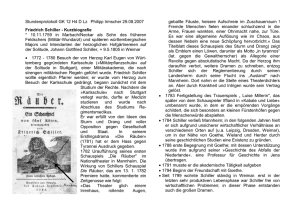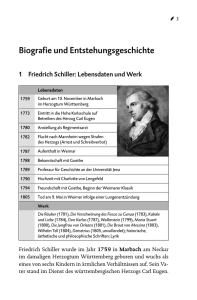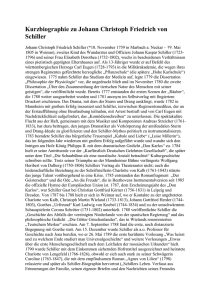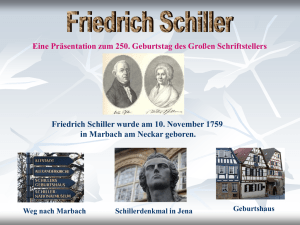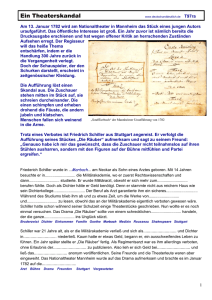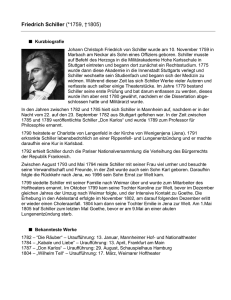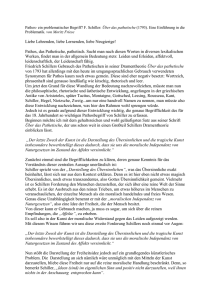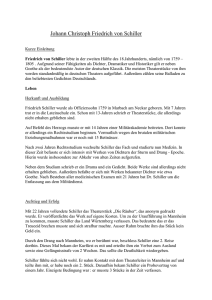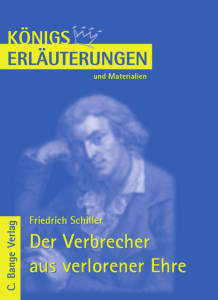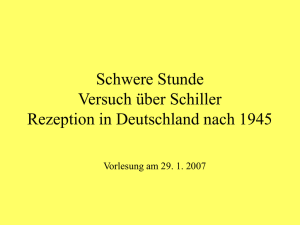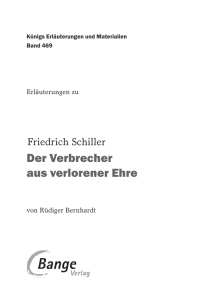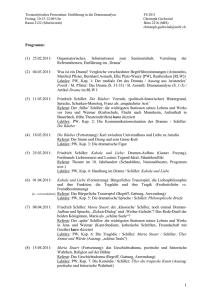JC Friedrich von Schiller (1759-1805)
Werbung
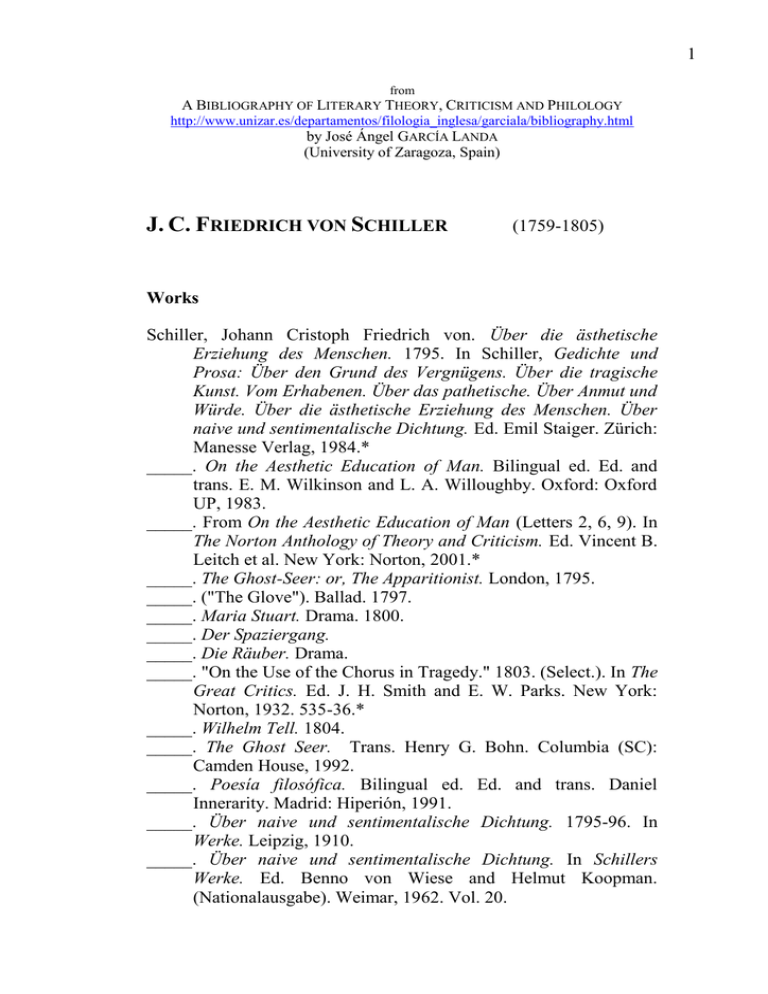
1 from A BIBLIOGRAPHY OF LITERARY THEORY, CRITICISM AND PHILOLOGY http://www.unizar.es/departamentos/filologia_inglesa/garciala/bibliography.html by José Ángel GARCÍA LANDA (University of Zaragoza, Spain) J. C. FRIEDRICH VON SCHILLER (1759-1805) Works Schiller, Johann Cristoph Friedrich von. Über die ästhetische Erziehung des Menschen. 1795. In Schiller, Gedichte und Prosa: Über den Grund des Vergnügens. Über die tragische Kunst. Vom Erhabenen. Über das pathetische. Über Anmut und Würde. Über die ästhetische Erziehung des Menschen. Über naive und sentimentalische Dichtung. Ed. Emil Staiger. Zürich: Manesse Verlag, 1984.* _____. On the Aesthetic Education of Man. Bilingual ed. Ed. and trans. E. M. Wilkinson and L. A. Willoughby. Oxford: Oxford UP, 1983. _____. From On the Aesthetic Education of Man (Letters 2, 6, 9). In The Norton Anthology of Theory and Criticism. Ed. Vincent B. Leitch et al. New York: Norton, 2001.* _____. The Ghost-Seer: or, The Apparitionist. London, 1795. _____. ("The Glove"). Ballad. 1797. _____. Maria Stuart. Drama. 1800. _____. Der Spaziergang. _____. Die Räuber. Drama. _____. "On the Use of the Chorus in Tragedy." 1803. (Select.). In The Great Critics. Ed. J. H. Smith and E. W. Parks. New York: Norton, 1932. 535-36.* _____. Wilhelm Tell. 1804. _____. The Ghost Seer. Trans. Henry G. Bohn. Columbia (SC): Camden House, 1992. _____. Poesía filosófica. Bilingual ed. Ed. and trans. Daniel Innerarity. Madrid: Hiperión, 1991. _____. Über naive und sentimentalische Dichtung. 1795-96. In Werke. Leipzig, 1910. _____. Über naive und sentimentalische Dichtung. In Schillers Werke. Ed. Benno von Wiese and Helmut Koopman. (Nationalausgabe). Weimar, 1962. Vol. 20. 2 _____. Two Essays by Friedrich von Schiller: NAIVE AND SENTIMENTAL POETRY and ON THE SUBLIME. Trans. Julius A. Elias. New York, 1966. _____. Gedichte und Prosa: Über den Grund des Vergnügens. Über die tragische Kunst. Vom Erhabenen. Über das pathetische. Über Anmut und Würde. Über die ästhetische Erziehung des Menschen. Über naive und sentimentalische Dichtung. Ed. Emil Staiger. Zürich: Manesse Verlag, 1984.* _____. Der Geisterseher. Sämtliche Erzählungen. Kehl: Swan, 1993? _____. Philosophische Briefe. _____. Don Carlos and Mary Stuart. Trans. Hilary Collier Sy-Quia. Adapted by Peter Oswald. Introd. Lesley Sharpe. (World's Classics). Oxford: Oxford UP, 1996. Goethe, J. W., and F. Schiller. "Über epische und dramatische Dichtung." 1797. In Goethe, Sämtliche Werke. Stuttgart: Jubiläum Ausgabe, 1902-7. 36.149-52. _____. "Über epische und dramatische Dichtung." 1797. In Goethes Werke. Ed. Erich Trunz. Vol. 12, Schriften zur Kunst, Schriften zur Literatur, Maximen und Reflexionen. Hamburg: Wegner, 1969. 249-51. _____. "On Epic and Dramatic Poetry." In Goethe, Essays on Art and Literature. Ed. John Gearey. Trans. Ellen von Nardroff and Ernest H. von Nardroff. Vol. 3 of Collected Works. New York: Suhrkamp, 1986. 192-94. _____, eds. Xenien. Epigrams. Humboldt, Wilhelm von. Der Briefwechsel zwischen Friedrich Schiller und Wilhelm von Humboldt. Ed. Siegfried Seidel. Berlin: Aufbau-Verlag, 1962. Biography Carlyle, Thomas. Life of Schiller. Serialized in the London Magazine (1823-24); book, 1825. Criticism Asensi Pérez, Manuel. "La ruptura con el clasicismo (segunda mitad del siglo XVIII)." In Asensi, Historia de la Teoría de la Literatura (Desde los inicios hasta el siglo XIX). Vol. 1. Valencia: Tirant lo Blanch, 1998. 289-317. (Vico, Lessing, Herder, Goethe, Sturm und Drang, Kant, Schiller).* 3 Constant, Benjamin. Réflexions sur la tragédie de Walstein et sur le théâtre allemand. 1809. Croce, Benedetto. "The Aesthetic of Idealism: Schiller, Schelling, Solger, Hegel." In Croce, Aesthetic. London: Vision Press / Peter Owen, 1967. 283-303.* de Man, Paul. "Kant and Schiller." In Aesthetic Ideology. Ed. Andrzej Warminsky. Minneapolis: U of Minnesota P, 1996. Erdmann, K. D. Kant und Schiller als Zeitgenossen der Französischen Revolution. Bithell Lecture 1985. Gadamer, Hans-Georg. "4. El juego como hilo conductor de la explicación ontológica." In Gadamer, Verdad y método: Fundamentos de una hermenéutica filosófica. Trans. Ana Agud Aparicio and Rafael de Agapito. (Trans. of 4th ed.). Salamanca: Sígueme, 1977.* (El concepto del juego. La transformación del juego en construcción y la mediación total. La temporalidad de la estética. El ejemplo de lo trágico). (Schiller, etc.). Habib, M. A. R. "16. Romanticism (I): Germany and France." In Habib, A History of Literary Criticism: From Plato to the Present. Oxford: Blackwell, 2005. 408-27.* (Friedrich von Schiller, Friedrich Schleiermacher, Germaine de Staël). Harnack, Otto. Die Klassische Ästhetik der Deutschen: Würdigung der Kunst-theoretischen Arbeiten Schillers, Goethes und ihrer Freunde. Leipzig, 1892. Kooy, Michael John. Coleridge, Schiller and Aesthetic Education. Houndmills: Palgrave Macmillan, 2002. Kraft, Herbert. Um Schiller betrogen. Pfullingen, 1978. Kremer, Josef. Das Problem der Theodicee in der Philosophie und Literatur des 18. Jahrhunderts mit besonderer Rücksicht auf Kant und Schiller. (Kantstudien, Ergheft 13). Berlin: Reuther 1909. Johann Nicolaus Tetens [und sein] ... Verhältnis zu Kant. (Kantstudien, Ergheft 24). Berlin: Reuther 1911. Mackenzie, Henry. "Account of the German Theatre." Paper read at the Royal Society of Edinburgh. 1788. (Schiller). Martin, Nicholas. Nietzsche and Schiller: Untimely Aesthetics. Oxford: Clarendon Press, 1996. Neuschäfer, Hans-Jörg. "El concepto de revolución en los Guillermo Tell de Friedrich Schiller (1804) y Alfonso Sastre (1955)." In Historia, lenguaje, sociedad: Homenaje a Emilio Lledó. Ed. M. Cruz, M. A. Granada and A. Papiol. Barcelona: Crítica, 1989. 456-70.* Safranski, Rüdiger. Schiller o la invención del idealismo alemán. Trans. Raúl Gabás. Barcelona: Tusquets, 2006 4 Schlüter, Hermann. Das Pygmalion-Symbol bei Rousseau, Hamann, Schiller. Zürich, 1968. Staël (Mme. de). De l'Allemagne. 1813. _____. Germany; by the Baroness Staël Holstein. Translated from the French. In Three Volumes London: John Murray, 1813. _____. "Part II. On Literature and the Arts." In Germany; by the Baroness Staël Holstein. Translated from the French. In Three Volumes London: John Murray, 1813. Sychrava, Juliet. Schiller to Derrida: Idealism in Aesthetics. 1989. Wagner, H. Ästhetik der Tragödie von Aristoteles bis Schiller. 1987. Journals Jahrbuch der deutschen Schillergesellschaft 17 (1973). Literature Tiutchev, Fiodor Ivanovich. ("In Memoriam" (of Schiller; in Russian). Poem. Music Liszt, Franz. "Die Ideale" S 646 Symphonic Poem no. 12. (Inspired by Schiller). _____. "Die Ideale." In Liszt, Symphonic Poems: Composer's Two Pianos Version. Prague Piano Duo. CD. (Praga Digitals). Prague: Praga Productions / Harmonia Mundi, 1997.* Verdi, Giuseppe. I Masnadieri. Opera. Based on Schiller's Die Räuber. Theatrical productions 5 Reinhardt, Max. Production of F. Schiller's trans. of Turandotte. c. 1920.
